Chemistry
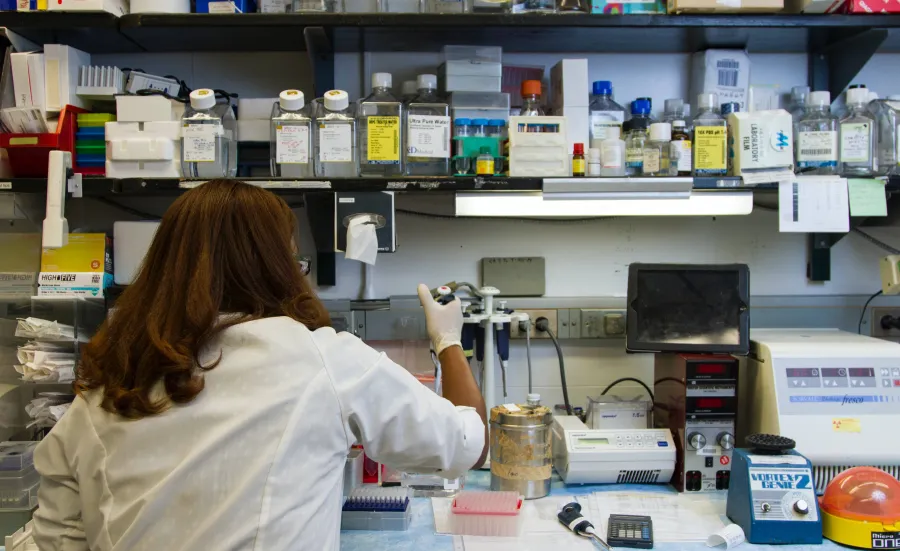
At Southampton, we'll support you to make your own contributions to chemistry research. You'll gain the skills to carry out advanced research in an academic or industrial environment as a professional scientist.

At Southampton, we'll support you to make your own contributions to chemistry research. You'll gain the skills to carry out advanced research in an academic or industrial environment as a professional scientist.

Chemistry at Southampton has a community of 200 people actively involved in research. Each year we accept more than 50 postgraduate students from a variety of backgrounds to study for chemistry research degrees.
While much of our research begins with concepts at a fundamental level, we are passionate about using the findings to make a real impact on the world around us.
The work of a research chemist is to find real-world problems produces business opportunities, enhances the quality of life, creates jobs, and boosts the economy, Our research has a significant impact on society, industry, government, and public service.
Our own graduate school offers a supportive environment for postgraduate study and personal development. This includes integrated training modules supervised by our scientists and a multidisciplinary and collaborative approach to science.
While most entrants have a background in chemistry we also welcome students with training in subjects including:
Usually a one-year programme that focuses on the design and execution of an original research project.
The project will occupy about two-thirds of the year, with the remainder of the time devoted to lectures and preparation of a chemistry MPhil thesis.
All students planning to complete a PhD must formally register for an MPhil degree in the first instance. Students can then transfer after one year to a PhD registration upon completion of a mini-thesis describing the project objectives and preliminary results.
You will normally complete a PhD programme in a period of 3 years after entry to the graduate school.
We have studentship vacancies in:
Studentships are either self-funded or funded from a variety of sources, including:
Our areas of research are:
As scientific research within the University becomes increasingly multidisciplinary, you may find that your chosen project area is jointly supervised by staff from other schools, such as:
The University of Southampton is pleased to announce that PGR students from EU and Horizon associated countries joining us in 2024-25 will pay the same as UK PGRs for their PhD.
In this project you will explore the fabrication of advanced materials for both catalysis and optical metamaterial applications.
This is a PhD Studentship in organic synthesis and chemical biology. This project focuses on developing novel backbone-modified therapeutic oligonucleotides (ONs) to improve stability, uptake, and affinity.
This project will involve the total synthesis of stereochemically complex natural products using new methods inspired by biosynthesis. The synthetic work will have potential applications in medicinal chemistry, the elucidation of biosynthetic pathways, and the structural assignment of natural products.
This research will focus on oral biofilms and their effects on oral health. The project is highly multidisciplinary and will pioneer a novel approach to control the formation and maturation of biofilm within the oral microbiome, combining the latest chemical biology technique with microbiological methods.
Quantum systems evolve in time. The pathway which a quantum system follows may be controlled by imposing selection rules on the dynamical evolution. This project involves a combination of theory, numerical simulation, and experiments involving local nuclear magnetic resonance equipment and through international collaborations.
This project will address the challenge of obtaining quality crystals for diffraction by co-crystallising with a second component. This method will be applied to characterise metabolites and impurities in agrichemicals, accelerating the discovery of new compounds. The chaperone approach aims to be impactful in agriculture and other fields generating new materials.
Fusion reactors, which promise a nearly limitless and clean energy source, require innovative solutions to overcome some of the world’s most significant scientific and engineering challenges. One critical hurdle is the integration of fibre sensors that can withstand ultra-high radiation and extreme temperatures. In this project, you can contribute to the development of sustainable fusion energy, helping to overcome a key challenge for our society and creating a green future for our world.
The future Quantum Internet requires efficient devices that store and recall arbitrary quantum states of light. These devices, known as quantum memories, can synchronise entanglement operations between distant locations. This project focuses on the development of rare-earth molecular complexes integrated with silicon nitride integrated photonic circuits.
Inhomogeneities degrade the performance of atom interferometers used for inertial and magnetic sensing. Optimal Control allows the design of laser pulse shapes that restore interferometer fidelity. This project will extend optimal control design beyond individual pulses to entire interferometer sequences and systems, and explore curious artefacts.
This project will use quantum optimal control to design and experimentally demonstrate new Nuclear magnetic resonance (NMR) quantum optimal control methods.
Metal halide perovskite nanocrystals are a promising platform for classical and quantum light emitters. They have great potential for single-photon emitters, which are key building blocks for quantum communication networks. This project combines synthesis, optical characterisation, and NMR studies of metal halide perovskite quantum dots and their optimisation for quantum emitters.
We offer a wide range of fully funded studentships. We run several of our PhD studentships in partnership with doctoral training centres, meaning you'll benefit from enhanced training and guaranteed funding.
These studentships:
In association with the UK joining the EU Horizon Programme, the University of Southampton will be introducing and applying an EU fee waiver for students joining us from EU and Horizon associated countries. This means that PGR students joining us from 2024-25 will pay the same fees as UK PGR students.
See here for full information terms and conditions
We offer scholarships and teaching bursaries ourselves. Your potential supervisor can guide you on what is available.
If you’re an international student you may be able to apply for a scholarship from your country.
Find out more about scholarships
Once you've found a supervisor, they can help you with potential funding sources. We offer match funding in some cases.
You'll need to state how you intend to pay for your tuition fees when you submit your application.
Find out more about funding your PhD
You may be able to fund your postgraduate research with funding from your current employer or from industry.
You can borrow up to £29,390 for a PhD starting on or after 1 August 2024. Doctoral loans are not means tested and you can decide how much you want to borrow.
Find out about PhD loans on GOV.UK
You may be able to win funding from one or more charities to help fund your PhD.
EU Fee Waiver: If your country is part of the Horizon Europe Programme, you will pay the same fees as UK students.
Find out if your country is part of the Horizon Europe Programme
2023 to 2024 entry:
| MPhil/PhD | UK fees and Horizon Programme applicants | International |
|---|---|---|
| Full time | tbc | £25,500 |
| Part time | tbc | £12,750 |
2024 to 2025 entry:
| MPhil/PhD | UK fees and Horizon Programme applicants | International |
|---|---|---|
| Full time | £4,786 | £26,100 |
| Part time | £2,393 | £13,050 |
2025 to 2026 entry:
| MPhil/PhD | UK fees and Horizon Programme applicants | International |
|---|---|---|
| Full time | To be confirmed Spring 2025 | £26,700 |
| Part time | To be confirmed Spring 2025 | £13,350 |
You're eligible for a 10% alumni discount on a self-funded PhD if you're a current student or graduate from the University of Southampton.

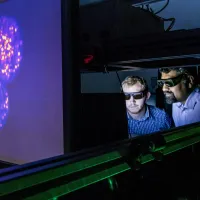

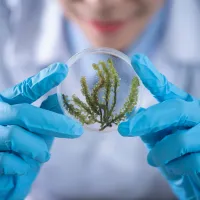



Decide whether to apply to an advertised research project or create your own proposal.
It's a good idea to email potential supervisors to discuss the specifics of your project. It's best to do this well ahead of the application deadline.
You’ll find supervisors’ contact details listed with the advertised project, or you can search for supervisors in the staff directory.
You’ll need to send us:
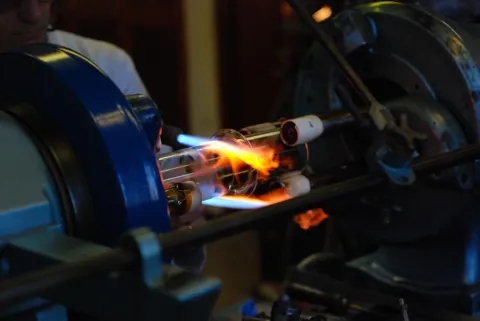
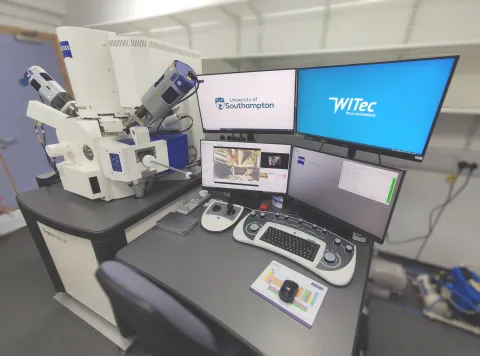
You need at least a 2:1 degree, or equivalent, in chemistry or a chemistry-related subject.
MPhil Chemistry applicants must also submit a University application form a transcript.
If English is not your first language, you'll need an IELTS minimum level of 6.5 with a 6.0 in writing, reading, speaking and listening.
Your awarded certificate needs to be dated within the last 2 years.
If you need further English language tuition before starting your degree, you can apply for one of our pre-sessional English language courses.
You will need to have a good science background and we will review your particular qualifications when you apply.
If you are a new postgraduate or MChem applicant and subject to immigration control, you should check if you need to apply for an Academic Technology Approval Scheme (ATAS) clearance certificate before you apply for a visa.
For further information see the Foreign and Commonwealth Office website. Your offer letter should contain all the relevant information you need for the ATAS application but if you have any queries please contact us.
Telephone: +44 (0)23 8059 4121
Email: pgafnes@southampton.ac.uk
Telephone: +44 (0)23 8059 8310
Email: chem-pgt-apply@southampton.ac.uk
Research degrees have a minimum and maximum duration, known as the candidature. Your candidature ends when you submit your thesis.
Most candidatures are longer than the minimum period.
| Degree type | Duration |
| Chemistry PhD full time | 2 to 4 years |
| Chemistry PhD part time | 3 to 7 years |
| Chemistry MPhil full time | 1 year |
| Chemistry MPhil part time | 2 to 3 years |